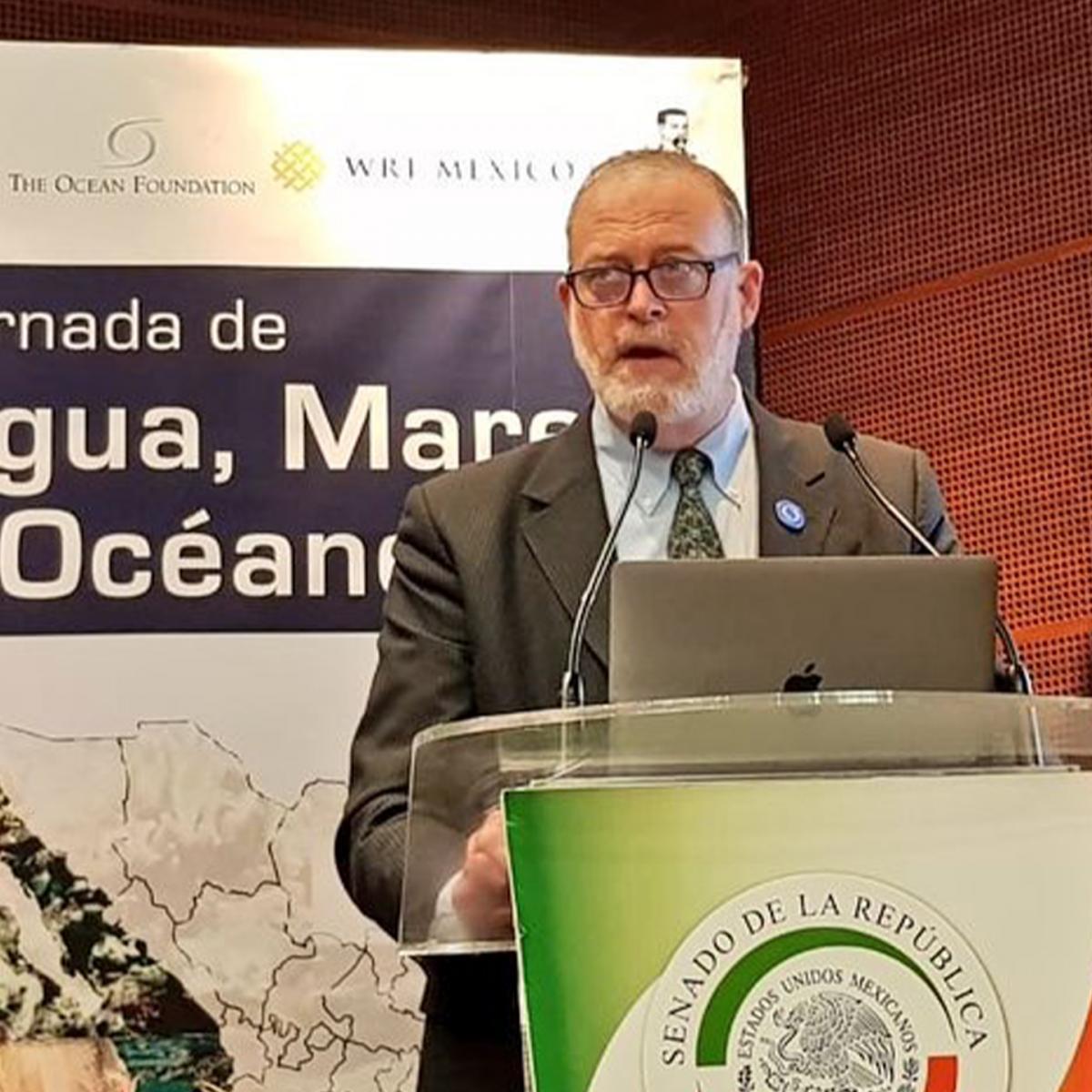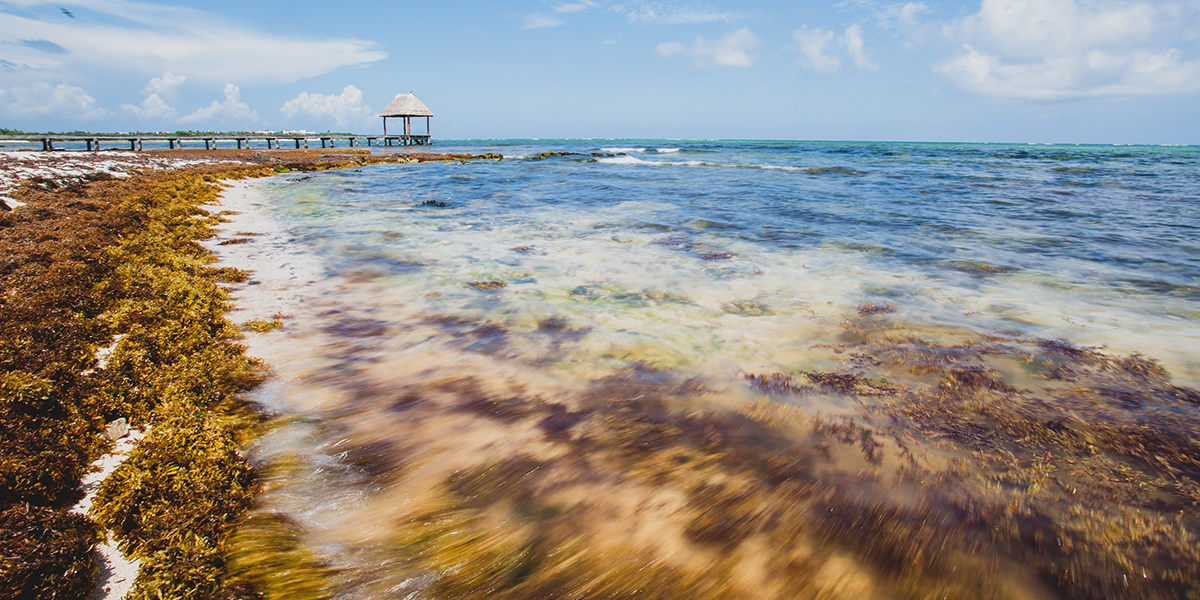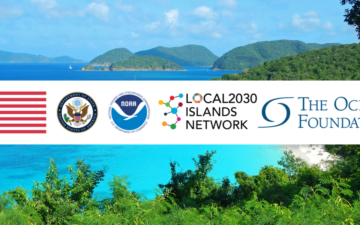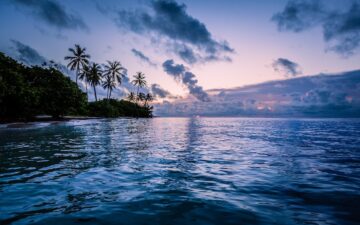Keynote
Wednesday, 9 October 2019
Honorable Senators and distinguished guests.
My name is Mark Spalding, and I am the President of The Ocean Foundation, and of the A.C. Fundación Mexicana para el Océano
This is my 30th year of working on conservation of coastal and ocean resources in Mexico.
Thank you for making us welcome at the Senate of the Republic
The Ocean Foundation is the only international community foundation for the ocean, with a mission to support, strengthen, and promote those organizations dedicated to reversing the trend of destruction of ocean environments around the world.
The Ocean Foundation’s projects and initiatives in 40 countries on 7 continents work to equip communities that depend on the ocean’s health with resources and knowledge for policy advising and for increasing capacity for mitigation, monitoring, and adaptation strategies.
This Forum
Today in this forum we are going to talk about
- The role of Marine Protected Areas
- Ocean acidification
- Bleaching and diseases of reefs
- Plastic ocean pollution
- And, the inundation of touristic beaches by huge blooms of sargassum
However, we can summarize what is wrong in two sentences:
- We take too much good stuff out of the ocean.
- We put too much bad stuff into the ocean.
We must stop doing both. And, we must restore our ocean after the harm already done.
Restore abundance
- Abundance has to be our collective goal; and that means positive ridge to reef activities and governance
- Governance has to anticipate potential change in WHAT is abundant and create the most hospitable waters for abundance—which means healthy mangroves, seagrass meadows, and marshes; as well as waterways that are clean and trash free, just as the Mexican Constitution and the General Law of Ecological Equilibrium envision.
- Restore abundance and biomass, and work to grow it to keep up with population growth (work on slowing or reversing that too).
- Have the abundance support the economy.
- This is not a choice about conservation protections versus the economy.
- Conservation is good, and it works. Protection and preservation work. BUT that’s just trying to defend where we are in the face of demands that are going to increase, and in the face of conditions that are changing rapidly.
- Our goal has to be abundance for food security and for healthy systems.
- Thus, we have to get ahead of population growth (including unfettered tourism) and its corresponding demands on all resources.
- So, our call has to change from “conserve” to “restore abundance” AND, we believe this can and should engage all interested parties who want to work for a healthy and profitable future.
Tackling Opportunities in the Blue Economy
The sustainable use of the ocean can provide Mexico with food and economic opportunities in fishing, restoration, tourism and recreation, together with transport and trade, among others.
The Blue Economy is the sub-set of the entire Ocean Economy which is sustainable.
The Ocean Foundation has been actively studying and working on the emerging Blue Economy for over a decade, and works with a wide range of partners including
- on-the-ground NGOs
- scientists researching this topic
- lawyers defining its terms
- financial and philanthropic institutions helping to bring the economic models and financing to bear, such as Rockefeller Capital Management
- and by working directly with local Natural and Environmental Resource ministries, agencies and departments.
Additionally, TOF has launched its own programmatic initiative called the Blue Resilience Initiative, that encompasses
- investment strategies
- carbon calculation offset models
- ecotourism and sustainable development reports and studies
- as well as the execution of climate mitigation projects that focus on the restoration of natural ecosystems, including: seagrass meadows, mangrove forests, coral reefs, sand dunes, oyster reefs and salt marsh estuaries.
Together we can identify the leading sectors where smart investment can ensure that Mexico’s natural infrastructure and resilience are secure to guarantee clean air and water, climate and community resiliency, healthy food, access to nature, and progress towards restoring the abundance our children and grandchildren will need.
The world’s coasts and ocean are a valuable and delicate part of our natural capital, but the “take it all now, forget about the future” business-as-usual model of the current economy is threatening not only marine ecosystems and coastal communities, but also every community in Mexico.
Development of the Blue Economy encourages safekeeping and restoration of all “blue resources” (including the inland waters of rivers, lakes and streams). The Blue Economy balances the need for social and economic development benefits with a strong emphasis on taking a long-term view.
It also supports the UN Sustainable Development Goals that Mexico has signed onto, and which take into consideration how future generations will be affected by today’s resource management.
The goal is to find a balance between economic growth and sustainability.
This blue economic model works toward improvement of human wellbeing and social equity, while also reducing environmental risks and ecological scarcities.
The blue economy concept emerges as a lens through which to view and develop policy agendas that simultaneously enhance ocean health and economic growth, in a manner consistent with principles of social equity and inclusion.
As the Blue Economy concept gains momentum, the coasts and ocean (and the waterways that connect all of Mexico to them) can be perceived as a new source of positive economic development.
The key question is: How do we beneficially develop and sustainably use the oceanic and coastal resources?
Part of the answer is that
- Blue carbon restoration projects revive, expand or increase the health of seagrass meadows, salt marsh estuaries, and mangrove forests.
- And all blue carbon restoration and water management projects (especially when associated with effective MPAs) can help mitigate ocean acidification—the biggest threat.
- Monitoring of ocean acidification will tell us where such climate change mitigation is a priority. It will also tell us where to do adaptation for shellfish farming etc.
- All of this will increase biomass and thus restore abundance and success of wild caught and farmed species — which gets at food security, a seafood economy and the alleviation of poverty.
- Similarly, these projects will help with the tourism economy.
- And, of course, the projects themselves will create restoration and monitoring jobs.
- All of this adds up to support for the blue economy and a true blue economy that supports communities.
So, what is The Role of this Senate?
Ocean places belong to all and are held in the hands of our governments as a public trust so that common spaces and common resources are protected for all, and for future generations.
We lawyers refer to this as the “public trust doctrine.”
How do we make sure Mexico protects habitat and ecological processes, even when those processes and life support systems are not fully understood?
When we know our disruption of the climate is going to shift ecosystems and disrupt processes, but without high levels of certainty about how, how do we protect ecological processes?
How do we ensure that there is sufficient state capacity, political will, surveillance technologies and financial resources available to enforce MPA restrictions? How do we ensure sufficient monitoring to allow us to revisit management plans?
To go along with these obvious questions, we also need to ask:
Do we have this legal doctrine of the public trust in mind? Are we thinking of all people? Remembering that these places are common heritage of all mankind? Are we thinking of future generations? Are we thinking about whether the seas and ocean of Mexico are being fairly shared?
None of this is private property, nor should it be. We cannot anticipate all future needs, but we can know that our collective estate will be more valuable if we do not exploit it with short-sighted greed. We have champions/partners in this Senate who will be responsible for these spaces on behalf of present and future generations. So please look toward legislation that:
- Fosters adaptation and mitigation of ocean acidification, and of human disruption of the climate
- Prevents plastic (and other pollution) from getting into the ocean
- Restores natural systems that provide resilience to storms
- Prevents land-based sources of excess nutrients that feed the growth of sargassum
- Creates and defends Marine Protected Areas as part of restoring abundance
- Modernizes commercial and recreational fisheries policies
- Updates policies related to oil spill preparedness and response
- Develops policies for siting of ocean-based renewable energy
- Increases scientific understanding of ocean and coastal ecosystems and the changes they are facing
- AND Supports economic growth and job creation, now, and for future generations.
It is time to reassert the public trust. It must be each of our governments and all governments that are exercising the trust obligations to protect natural resources for us, for our communities, and for future generations.
Thank you.
This keynote was given to attendees of the Forum on Ocean, Seas, and Opportunities for Sustainable Development in Mexico on October 9, 2019.








